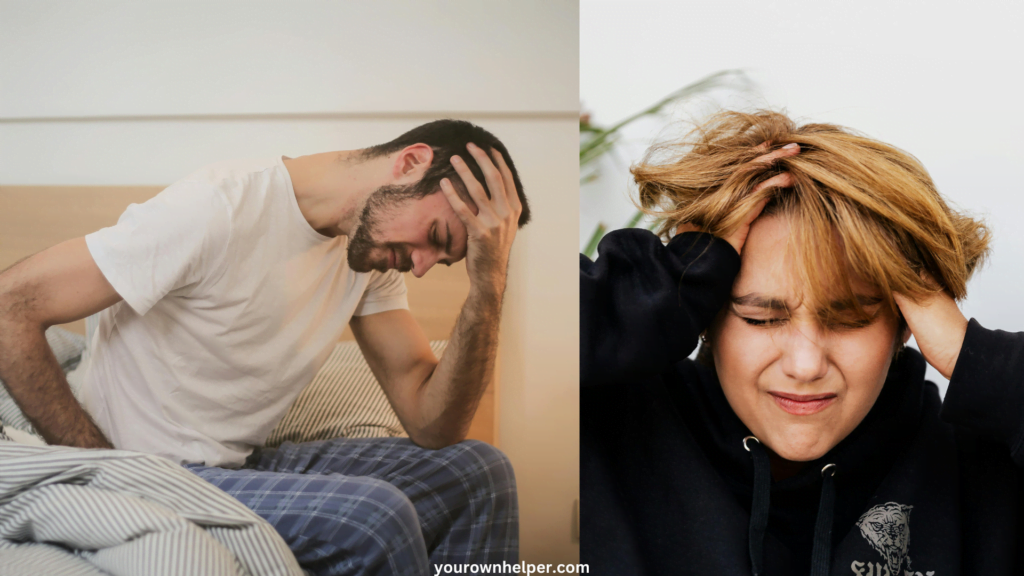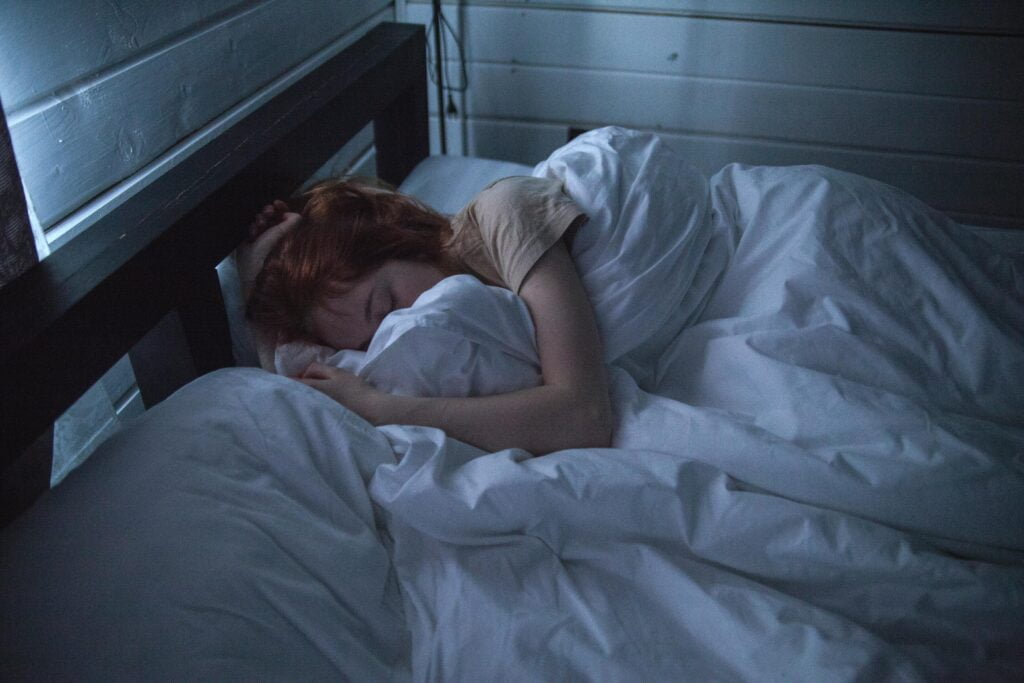
You awaken in the middle of the night in a chilly sweat, your heart beating. Your chest feels constricted, and you can’t breathe. You have an overwhelming sensation of terror and gloom, but you don’t understand why. You are having a nighttime panic attack. These nocturnal bouts can be even more terrifying than daytime ones. The darkness and seclusion exacerbate the panic. However, you are not alone in experiencing these symptoms. Nighttime panic attacks are widespread, but sometimes misunderstood. In this post, we’ll look at the symptoms of these midnight terrors and provide suggestions for dealing with them and preventing future instances. Arm yourself with information and take back the night.
Table of Contents
Understanding Panic Attack Symptoms at night
Panic attacks at night can be terrifying. You wake up in the middle of the night with your heart pounding, struggling to breathe, and feeling intense fear for no reason. These episodes are caused by a rush of adrenaline in your body that makes you feel like you’re In danger when you’re not.
Physical Symptoms
The physical symptoms of nighttime panic attacks are frightening and include:
- Rapid, pounding heartbeat
- Chest pain
- Nausea
- Sweating
- Shortness of breath
- Feeling lightheaded or dizzy
Triggers
There are a few possible triggers for nighttime panic attacks:
- Lack of sleep or insomnia: Not getting enough sleep can increase feelings of anxiety and make you more prone to panic attacks.
- Stress or anxiety: Feeling very stressed or anxious during the day can continue into the night and trigger an attack while you’re sleeping.
- Nightmares: A frightening nightmare may startle you awake and trigger a panic attack. The fear from the dream combined with waking up suddenly can spur an adrenaline rush.
How to Cope
The best ways to handle nighttime panic attacks Include:
- Practice relaxation techniques like deep breathing, meditation, or yoga before bed to unwind.Challenge negative and irrational thoughts.
- Remind yourself that the panic will pass and you’re not in any real danger.
- Don’t isolate yourself. Wake someone else up or call a friend or loved one.
- Talking to others can help you feel calmer.
- Seek professional help from a therapist if nighttime panic attacks are frequent or severe, Cognitive behavioral therapy (CBT) can be very effective for panic disorder.
With the proper self-care and treatment, you can overcome your nighttime panic attacks and rest easy. The key is learning how to manage anxiety and fear in a healthy way.
Common Symptoms of Nocturnal Panic Attacks

Rapid heartbeat and chest pain At night, you may wake up with your heart racing and pounding in your chest. You may. also experience chest tightness or pain. These scary sensations can make you feel like you’re having a heart attack, even though it’s really just a panic attack.
Difficulty breathing
During a nocturnal panic attack, you may feel like you can’t get enough air or that your throat is closing up. You may start hyperventilating or experience shortness of breath. Try taking slow, deep breaths to help yourself calm down.
Nausea or dizziness
The Intense fear and physical arousal during a panic attack can lead to feelings of nausea, dizziness or lightheadedness. Don’t be alarmed; these sensations are not dangerous and will pass once your panic attack subsides.
Sense of doom
You may wake up with an overwhelming sense of dread, doom or fear. Your mind may race with frightening thoughts about losing control or impending disaster. Remind yourself that these thoughts are not based in reality; they are just a symptom of your panic and will go away.
Nocturnal panic attacks can be terrifying to experience, but the good news is they are not physically harmful and will not last indefinitely. The symptoms are a result of a rush of adrenaline in response to a perceived threat. By recognizing the symptoms as panic- related and not dangerous, using relaxation techniques, and seeking professional help if needed, you can overcome your nighttime panic and rest easy again.
What Causes Panic Attacks at Night?

Panic attacks can strike at any time, but nighttime episodes often feel more frightening and intense. Several factors contribute to nocturnal panic.
Increased Anxiety at Night
For many, anxiety levels rise at night. The darkness can make worries and fears seem larger than life. You may feel more vulnerable or unsafe in the dark. Without the usual distractions of the day, anxiety and panic-inducing thoughts have more opportunity to surface.
Changes in Sleep-Wake Cycle
Our sleep-wake cycle goes through natural fluctuations at night that can trigger panic attacks in some. For example, the transitions between wakefulness and sleep (called hypnagogic states) can cause a spike in anxiety. Waking from sleep abruptly can also lead to a panic attack for those prone to nocturnal anxiety.
Health Conditions
Certain conditions, like nocturnal asthma, gastroesophageal reflux disease (GERD), and sleep apnea, can trigger the bodily sensations that lead to panic at night. The difficulty breathing from these conditions activates our body’s “fight or flight” response, even when there’s no real danger. Getting diagnosed and treated for any underlying health issues may help reduce your nighttime panic attacks.The nighttime darkness and changes in our sleep-wake cycle chemistry are ahemistry. conspire to create the perfect conditions for nighttime panic to strike. But don’t lose hope. By understanding the causes, you can take steps to establish nightly rituals, minimize anxiety triggers, and get any medical conditions properly diagnosed and treated. Sweet dreams and a panic-free night can be within your grasp.
Tips for Coping With and Preventing Nighttime Panic

Practice relaxation techniques before bedTake some time to unwind and de-stress before you try to sleep. Meditation, deep. breathing, a warm bath, or light yoga can help relax your body and mind. The more relaxed you are at bedtime, the less likely panic symptoms are to arise in the middle of the night.
Challenge negative thoughts
Notice any negative or catastrophic thoughts you have at night and try to challenge them with more positive, realistic thoughts. For example, replace “I’m going to have a heart attack” with “I’ve had panic attacks before and was fine. This will pass.” Looking at the situation rationally can help prevent panic.
Don’t fight the panic
As scary as the symptoms feel, remind yourself that a nighttime panic attack cannot hurt you. Fighting the feelings will only make them intensify. Instead, try to accept the symptoms and stay calm. The panic will pass much quicker if you don’t add further anxiety on top of It. Focus on your breathing and the present moment.
Get out of bed
If you have a panic attack at night, get out of bed and do an activity to distract yourself, like reading a book, taking a warm bath, or calling a friend. Going about your nighttime routine as usual can help you feel more in control of the situation. The movement and distraction will also cause your panic symptoms to subside quicker than lying still in bed.
Maintain a routine
A consistent, calming bedtime routine can prevent nighttime panic attacks. Going. to bed and waking up at the same time every day helps keep your body’s circadian rhythm in check and promotes better sleep. A routine that avoids screens, bright lights and stressful activities 1-2 hours before bed is ideal. Sticking to a routine will make middle-of-the-night waking less likely.By practicing self-care, challenging negative thoughts, and not fighting the panic, you can reduce nighttime anxiety and cope with panic attacks when they do happen. The more you confront fearful situations, the less power they have over you. With time and practice,nighttime panic should subside.
FAQs: Frequently Asked Questions About Nighttime Panic Attacks
What causes nighttime panic attacks?
Panic attacks at night can be triggered by a variety of factors. Anxiety and stress from the day may manifest once you’re trying to sleep. Lying in bed with nothing to distract you can cause worries and fears to intensify. Caffeine or nicotine intake too close to bedtime can also trigger panic attacks. For some, a fear of the dark or nighttime Itself may be an underlying cause.
What are the symptoms of nighttime panic attacks?
You may experience a racing heartbeat, chest pain, sweating, sensations of dizziness, or nausea. Feelings of impending doom and loss of control are also common. Some people report feeling detached from themselves or reality. The symptoms can be frightening and intense, even though a panic attack itself is not dangerous.
How can I prevent nighttime panic attacks?
Establishing a calming bedtime routine can help. Limit caffeine and exercise in the hour before bed. Practice relaxation techniques like meditation, deep breathing, or a warm bath before sleeping. Challenge any fearful thoughts about the night or dark and replace them with more positive ones. Make sure to get enough sleep every night to avoid fatigue, which can exacerbate symptoms of anxiety or panic. Speaking to a therapist can also help determine the underlying cause of your nighttime panic attacks and provide coping strategies.
What should I do if I experience a nighttime panic attack?
Staying calm is key. Remind yourself that the panic will pass and you are not in any real danger. Practice controlled breathing and progressive muscle relaxation.continue totinue.to struggle, get up and do some exercise, like walking or stretchingisolate yourself; call someone who can help distract and comfort you. Once you feel better, head back to bed and focus on rimagery Imagery or sounds to help you fall asleep.You can get through this! With regular management of panic attacks, their frequency and intensity will decrease over time.
Conclusion
So, there you have it. Nighttime panic episodes can be frightening and bothersome, but you don’t have to deal with them alone. Now that you understand what is going on and why, you may make efforts to alleviate the symptoms. It may take some trial and error to figure out what works best for you, whether it’s breathing exercises, meditation, medication, or a mix. But don’t be discouraged. You can get relief with patience and consistency. The most essential thing is to be patient and gentle with yourself throughout the process. This, too, shall pass. Continue to persevere, and remember that you have the power to reclaim your nights and your calm. Sweet dreams.Learn more
